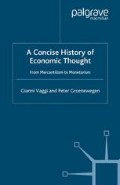Abstract
The second half of this history of economics is called modern developments because it covers the period during which the foundations were laid for much of the contemporary mainstream theory of economics, both in its micro-, and in its macro-parts. The essentials of modern micro-economics can be said to have emerged from the theoretical developments which took place during the ‘marginal revolution’ of the 1870s, which were consolidated and expanded during the closing decades of the nineteenth century. Sections I and II are specifically devoted to describing the highlights of this process by way of looking at some of the major contributions in Europe and across the Atlantic from the early 1870s onwards. Macro-economics, the theory of aggregates such as output and employment as a whole, the price level, rather than the individual decision-making which is the focus of micro-economics, was developed as a specific and direct consequence of the Keynesian revolution of the 1930s. The history of economics to be covered in Part II is therefore clustered around two major ‘revolutions’ in economic thought, the so-called ‘marginal’ and ‘Keynesian’ revolutions. This introduction briefly explores the meaning of these terms.
Access this chapter
Tax calculation will be finalised at checkout
Purchases are for personal use only
Preview
Unable to display preview. Download preview PDF.
Notes for further reading
T.W. Hutchison in his collection of essays, On Revolutions and Progress in Economic Knowledge (Cambridge University Press, Cambridge, 1978, esp. chs 4–7).
Nikolai Bukharin (The Economic Theory of the Leisure Class, International Publishers, New York, 1927)
Robbins, The Nature and Significance of Economic Science, Macmillan (now Palgrave Macmillan), 1934, chapters 1–2
Joan Robinson, (On Re-reading Marx in Collected Economic Papers, Blackwell, Oxford, 1973, Vol. IV, Part III)
Peter Clarke, a Cambridge historian (The Keynesian Revolution in the Making, 1924–36), Clarendon Press, Oxford, 1988, esp. chs 11, 12).
Lawrence Klein’s book, The Keynesian Revolution (Macmillan — now Palgrave Macmillan, London, 1966)
G.L.S. Shackle, The Years of High Theory 1926–1939 (Cambridge University Press, Cambridge, 1967, chs 11–14, esp. ch. 12
Luigi Pasinetti, Growth and Distribution, Cambridge University Press, Cambridge, 1974, ch. 2).
Author information
Authors and Affiliations
Copyright information
© 2003 Gianni Vaggi and Peter Groenewegen
About this chapter
Cite this chapter
Vaggi, G., Groenewegen, P. (2003). Introduction: the Coming of Marginalism and Macro-economics. In: A Concise History of Economic Thought. Palgrave Macmillan, London. https://doi.org/10.1057/9780230505803_17
Download citation
DOI: https://doi.org/10.1057/9780230505803_17
Publisher Name: Palgrave Macmillan, London
Print ISBN: 978-1-4039-8739-6
Online ISBN: 978-0-230-50580-3
eBook Packages: Palgrave Economics & Finance CollectionEconomics and Finance (R0)

